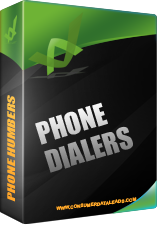Phone Dialers
 |
|||||||||||
|
Phone Dialers Minimum Order is 10k phone numbers for $1000.00 Bulk Phone Number Program: DISCLOSURE:
|
|
New Rule |
Effective |
What is the new requirement? |
| Prior express written consent | October 16, 2013 | Unambiguous written consent required before telemarketing call or text message. Exception: calls that are manually dialed and do not contain a pre-recorded message are exempt from the TCPA. |
| No “established business relationship” exemption | October 16, 2013 | Established business relationship no longer relieves advertisers of prior unambiguous written consent requirement. |
1) Beginning October 16, 2013, prior express written consent will be required for all autodialed and/or pre-recorded calls/texts sent/made to cell phones and pre-recorded calls made to residential land lines for marketing purposes.
Compliance with the E-SIGN Act satisfies this requirement, meaning that electronic or digital forms of signature are acceptable (i.e., agreements obtained via email, website form, text message, telephone keypress or voice recording).
Consumer consent must be unambiguous, meaning that the consumer must receive a “clear and conspicuous disclosure” that he/she will receive future calls that deliver autodialed and/or pre-recorded telemarketing messages on behalf of a specific advertiser; that his/her consent is not a condition of purchase; and he/she must designate a phone number at which to be reached (which should not be pre-populated by the advertiser in an online form). Limited exceptions apply to this requirement, such as calls/texts from the consumer’s cellular carrier, debt collectors, schools, informational notices and healthcare-related calls.
If a dispute concerning consent arises, the advertiser bears the burden of proof to demonstrate that a clear and conspicuous disclosure was provided and that the consumer unambiguously consented to receive telemarketing calls to the number he/she specifically provided. It is a best practice for advertisers to maintain each consumer’s written consent for at least four (4) years, which is the federal statute of limitations to bring an action under the TCPA. Evidence of Internet-provided written consent includes, but is not limited to, website pages that contain consumer consent language and fields, associated screenshot of the consent webpage as seen by the consumer where the phone number was inputted, complete data record submitted by the consumer (with time and date stamp), together with the applicable consumer IP address.
2) Beginning October 16, 2013, the “established business relationship” exemption for pre-recorded telemarketing calls to residential landlines will be eliminated.
In the past, advertisers could rely on an established business relationship (such as a previous purchase) to circumvent the need to obtain a consumer’s written consent to receive telemarketing calls. That exception to the consent requirement will no longer exist after this year. Advertisers will have to obtain written consumer consent, outlined above, even if they previously had a business relationship with the consumer.
What are the penalties for failing to comply with the TCPA?
The TCPA provides for either actual damages or statutory damages ranging from $500.00 to $1,500.00 per unsolicited call/message. In determining the final amount of statutory damages to award, courts analyze whether the defendant “willfully” or “knowingly” violated the TCPA. Considering that telemarketing campaigns often involve thousands to, in some cases, millions, of calls/text messages, potential damages under the TCPA may escalate very quickly.
|
Sample Website Consent Language |
I hereby consent to receive autodialed and/or pre-recorded telemarketing calls from or on behalf of [ADVERTISER] at the telephone number provided above. I understand that consent is not a condition of purchase. |
Phone Dialers
